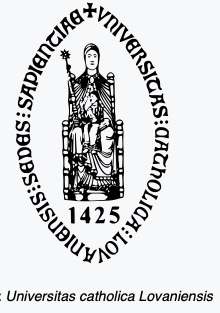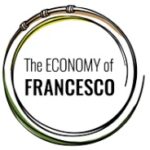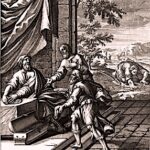Pope Francis’ address to University Professors
Promotiezaal of the Katholieke Universiteit Leuven
Friday, 27 September 2024
Why is it that man, despite so much progress, is unknown to himself and becomes ever more so
Distinguished Rector,
Esteemed Professors,
Dear brothers and sisters,
I am delighted to be here among you. I thank the Rector for his words of welcome in which he reflected on the tradition and historical roots of the University, and on the main challenges we all face today. Indeed, the first task of a university is to offer integral formation so that students are equipped with the necessary tools to interpret the present and plan for the future.
But cultural formation is never an end in itself, and universities should never run the risk of becoming “cathedrals in the desert”.
By their very nature, they are engines of ideas, sources of new inspiration for human life and thought, and for meeting the challenges in society.
In other words, they are generative places.
It is a good thing to see universities as generators of culture and ideas, but above all as fosterers of a passion for the search for truth, at the service of human progress.
In a special way, Catholic Universities, such as yours, are called to “offer the decisive contribution of leaven, salt and light of the Gospel of Jesus Christ and of the living Tradition of the Church, always open to new situations and ideas” (Apostolic Constitution Veritatis Gaudium, 3).
I would now like to invite each of you:to expand the boundaries of knowledge!
Instead of multiplying concepts and theories, make academic and cultural education a critical space that both understands and speaks about life.
There is a short biblical story in the Book of Chronicles that I would like to share with you.
The protagonist, Jabez, made this plea to God: “Oh that you would bless me and enlarge my border” (1 Chron 4:10 – Jabez called on the God of Israel, saying, “Oh that thou wouldst bless me and enlarge my border, and that thy hand might be with me, and that thou wouldst keep me from harm so that it might not hurt me!” And God granted what he asked.). The name Jabez means “pain”, a name he was given because his mother had suffered greatly during childbirth. But Jabez does not want to shut himself up in his own pain and drag his feet in mourning. Instead, he asks the Lord to “expand the boundaries” of his life so that he can enter a larger, more welcoming and blessed place. The opposite of this is closures. Expanding boundaries and becoming an open space for humanity and for society is the great mission of a university.
In our own day, we find ourselves facing an ambivalent situation with its limited boundaries.
On the one hand, we are immersed in a culture characterises by a refusal to seek the truth.
We have lost the ardent passion for searching.
We would rather find comfort and refuge in the tenuous thought – the drama of the tenuous thought! – taking refuge in that all things are equal, all things are the same, all things are relative.
On the other hand, when the question of truth arises in university contexts and elsewhere, we can often fall into a rationalist approach, taking as “true” only those things that can be measured, tested by experiment, and touched, as if life were uniquely limited to what is material and visible.
In both cases, the boundaries are limited.
With regard to the first type of limitation, we find a kind of “intellectual weariness”, which leaves us to a permanent state of uncertainty, ldevoid of all passion, as if the search for meaning were pointless and reality incomprehensible.
This view of the world is expressed by some of the characters in Franz Kafka’s works, which describe the tragic and distressing human condition of the nineteenth century.
In a dialogue between two characters in one of his stories, we find this affirmation: “I think she doesn’t care about the truth because it’s too tiring” (Tutti i racconti, Milano 1990, 38).
Searching for the truth is indeed tiring because it forces us to move beyond ourselves, to take risks, to ask ourselves questions.
But intellectual fatigue makes a superficial life more appealing to us, a life that is not open to new challenges.
There is also the danger of being attracted to an easy, effortless and comfortable “faith” that does not question anything.
Turning to the second kind of limits, we are in danger today of falling back into a “soulless rationalism”, conditioned by a technocratic culture that leads us there..
When man are regarded as mere matter, when reality is confined to the limits of the visible, when reason is reduced to mathematical logic, when reason comes only from the “laboratory”, then wonder is lost, and when it is lacking, one cannot think. Wonder is the beginning of philosophy.
It is the beginning of thinking.
In this way, we lose our capacity for wonder, which urges us to look beyond, to raise our eyes to the sky, to delve into the hidden truth that addresses the fundamental questions such as Why am I alive? What is the meaning of my life? What is the ultimate goal and purpose of this journey?
Romano Guardini asked himself:
“Why is it that man, in spite of so much progress, is unknown to himself and becomes ever more unknown?
It is because he has lost the key to understanding his own nature.
The law of our truth is that man understands himself only if he begins from above, from beyond himself, from God, because man’s very existence comes from Him” (Preghiera e verità, Brescia 1973, 56).
Dear professors, instead of falling into intellectual weariness or a soulless rationalism, may we too learn to pray like Jabez: “Lord, widen our borders!”
Let us ask God to bless our work, at the service of a culture capable of facing today’s challenges.
The Holy Spirit, whom we have received as a gift, urges us to search, to open up spaces for our thought and action, until he leads us into the fullness of truth (cf. Jn 16:13).
We are aware, as the Rector said earlier, that “we do not yet know everything”.
At the same time, it is this very limitation that drives us forward, that helps us to keep the flame of research burning and to remain an open window on today’s world.
In this regard, I would like to express sincere words of gratitude:
Thank you for expanding your borders to become a welcoming environment for refugees who have been forced to flee their countries in the midst of great insecurity, enormous hardship and often unbearable suffering. We have just seen a moving video testimony. While some people call for the reinforcement of physical borders, you have expanded borders as a university community. Thank you.
You have opened your arms in welcome to those marked by suffering, to help them study and grow. Thank you.
Indeed, what we need is a culture that extends boundaries, and avoids “sectarianism” – and thank you for not being secterian – or exalting oneself above others.
A culture that works as a good “leaven” in our world, contributing to the common good of humanity. This responsibility, this “great hope” is entrusted to you!
A theologian from your country, a student and professor of this university, said: “We are the burning bush that makes God manifest” (A. Gesché, Dio per pensare. Il Cristo, Cinisello Balsamo 2003, 276). Keep this flame alive; extend the frontiers!
Be uncomfortable with the restlessness of life, be restless seekers of truth, and do not let your enthusiasm fade, lest you fall into intellectual lethargy, which is a very serious disease.
Be protagonists in creating a culture of inclusion, compassion and attention to the weakest, as you seek to overcome the great challenges of our world today.
And please do not forget to pray for me. Thank you very much!


